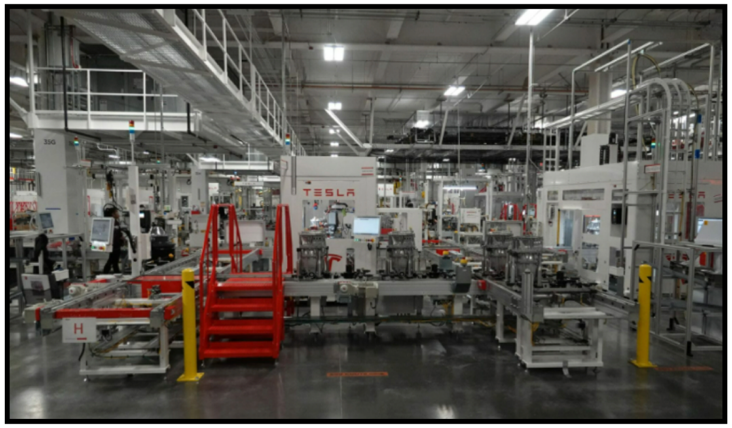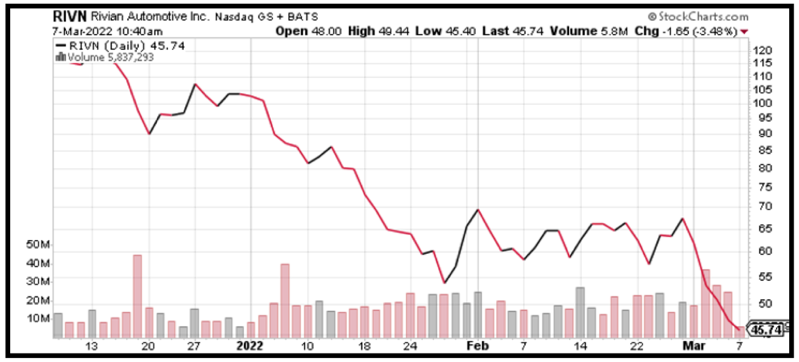Electric vehicles (EVs) are undoubtedly the future of transportation.
If history is any indication, making those next generation cars and trucks is going to be harder than anticipated, though.
Last week, executives at Rivian (RIVN) and Lucid Motors (LCID) announced that rising inflation costs and newbie production snafus are wreaking havoc with their previous plans.
When Rivian and Lucid launched as public companies last year, investment bankers were careful to frame the EV makers as Tesla (TSLA) alternatives.
It made sense.
Despite abundant naysayers …
- Tesla has been a big winner for shareholders, rising an astonishing 24,556% in the 12 years since its 2010 initial public offering (IPO) debut.
The performance is due mostly to CEO and founder Elon Musk's genius. He positioned the business to win automobile mindshare, and engineers at Tesla built a better car.
It just happened to also have an electric propulsion system.
- Musk and his financial team then did the hard work of figuring out how to build those vehicles at scale, and for a profit.
Competitors are having a much more difficult time finding success.
At least initially, investors were willing to give Rivian and Lucid the benefit of the doubt. Neither firm was remotely close to scale production, yet the money flowed in.
Rivian secured $12 billion from its November 2021 IPO.
Within days, the market capitalization reached $159 billion. Lucid was the target of a bidding war for one of the largest special purpose acquisition deals ever.
Related Post: Crypto's First War
In the end, Churchill Capital IV injected $4.4 billion into the luxury EV maker. The market cap immediately shot to $24 billion.
Rivian announced last December that production would fall 25% short of its 2021 target of 1,200 vehicles.
The company, based in Irvine, California, is now struggling to make only 50 vehicles per week despite the proclamation that its facility in Normal, Illinois, will be capable of producing 150,000 annually by 2023, according to a report in January from The New York Times.
The story is similar in Casa Grande, Arizona, the production home of Lucid Motors.
The company made only 125 vehicles in 2021, and 300 units in total through February. Undaunted, executives still plan to make 12,000 to 14,000 EVs this year, although that is down from the original 2022 target of 20,000 units.
If you'd like more specific trading recommendations, I highly encourage you to check out my Weiss Technology Portfolio service, where I help subscribers find winning plays that are shaping the landscape of the digital transformation. If you'd like more information, click here now.
The shortfalls at Rivian and Lucid are stunning ... yet actually not unprecedented.
Tesla experienced similar growing pains in 2018 as production geared up for the Model 3, its first mass market EV.
Suppliers were unwilling to fill its relatively small orders in a timely fashion. Bottlenecks crimped manufacturing further.
Bloomberg later reported that Musk admitted the "production hell" pushed Tesla near bankruptcy.
Tesla has mostly overcome these obstacles … but competitors can't say the same.
Lucid and Rivian are tiny players in the global automotive supply chain. The prospect of securing parts is made worse by the pandemic, inflation and the reality that all the major automakers are simultaneously ramping up new EV production.
At least 50 new EVs are expected to hit the market by 2024, according to Garrett Nelson, an analyst at CFRA Research.
Related Post: Ford Investors Should Rev Their Engines
Shares of Rivian and Lucid were down last week by 25% and 14%, respectively, following a series of corporate announcements
Rivian executives cited supply chain and inflation pressures on Thursday as they announced price increases of 20%, even for previously ordered vehicles.
The price increase was rescinded a day later for pre-orders. And Lucid chieftains said 2022 planned production would fall to no more than 14,000 units.
- Despite the weakness, both Rivian and Lucid stocks still seem absurdly expensive.
Rivian boasts a market cap of $42 billion and claimed reservations of 71,000 EVs.
If the company can sell most of its RT1 at the original $67,500 asking price, sales will be less than $5 billion.
Lucid executives say 25,000 customers have reserved vehicles with a total value of $2.4 billion.
Worse, both firms are likely to struggle for years to fulfill existing pre-orders. During that time, operations will continue to burn through cash.
Savvy investors should resist any temptation to buy the current weakness. I would wait for another leg lower.
Remember to always do your own due diligence before buying anything.
Best wishes,
Jon D. Markman



